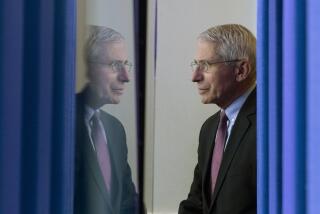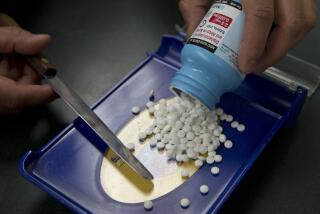The Faces Behind Biotech
- Share via
Italian-born, 30-year-old Alex Sette is having a great time in his science lab, and, to hear him tell it, he’s not doing too bad for himself after work, either.
Thanks in part to a family inheritance, he drives a red Porsche. He lives in a La Jolla home with an ocean view. He’s developing a home library. To relax, he tends to a garden.
And when he dates, he looks for women who don’t have a science connection.
“I hear about T-cells all during the day. I don’t want to discuss them while I’m laying in bed,” he smiles.
Sette, who has a Ph.D. in immunology and holds the title of associate director of immunochemistry at Cytel, is looking for new drugs that will modulate the body’s immune system, to help make sure it functions in delicate balance.
“I’m operating in the real world where I can make a difference. It’s not like I’m working on a chemical reaction that no one cares about but you and your four colleagues, who are the only ones who can understand what the hell you are talking about.
“Maybe someone who had rheumatoid arthritis won’t have it anymore because of my achievements. I get my cake and eat it, too.”
But the work pace can be exhausting. At Cytel, as at other biotech companies, it may take 10 years or more of design and development work before a drug can be approved for use by the government.
“When I was doing research work (at the National Jewish Hospital in Denver), I could work at my own pace. If I felt like doing an experiment, I would. If I wanted to think about it for a couple of days, I would.
“Here, there’s a lot of pressure to develop something, to go somewhere with your research. I just came back from Denver, where I chaired a meeting, and I’ll spend two days in the lab before going to Switzerland for more meetings, and from there to Milan, for another talk.
“In this (commercial) work, there’s less time to be mystical about your science. You need to be more pragmatic.”
But he’s not complaining. “I got sucked into science. I liked collecting skeleton bones when I was a child--and that didn’t go over very well at home.
“Everybody else in my family is a lawyer. I was always the strange one. My family would ask me, ‘What, you want to be an immunologist? Why don’t you be a lawyer like everybody else, and make lots of money?’
“But I like the purity of science, and the challenge of linking it to the real world.”
Being a scientist, he says, lets him shun the rest of the world when he feels like it.
“It’s almost like being a hermit. It’s a wonderful excuse, if you want to escape from the world, to say, hey, I’m a scientist. I’m supposed to be strange, and on my own. It’s a wonderful mechanism of defense, to shut everything out.”
For therapy this particular morning, he said, he picked broccoli.
And drove to work in his Porsche.






